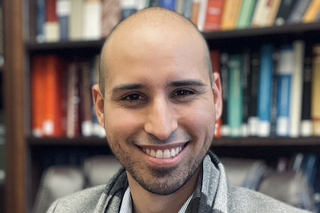Open To: General Public
Admission: Free
Location: ISM Great Hall, 409 Prospect Street, New Haven
Description: A(nother) Proto-feast for the Protomartyr
Abstract: In the early fifth century, the church of Jerusalem commemorated St. Stephen the Protomartyr on 26/27 December and 7 January. The presence of multiple celebrations for a single saint within the same two-week period, is remarkable. Unfortunately, few attempts have been made to explore the origins of these ostensibly redundant celebrations. Still less has been done to understand the relationship between these feasts in the eyes of the local Jerusalem community. This presentation will locate the origin of these celebrations in the city’s lingering insecurities following the Aelia period (135–313 CE), and its desire to develop a local cult of martyrs parallel to those long since in place in other cities (e.g., Rome).
Hugo Mendez completed his Ph.D. at the University of Georgia, exploring the poetry of the infancy hymns of the gospel of Luke. In his fellowship year at Yale, he will complete a monograph piecing through literary, liturgical, and material evidences of the cult of Stephen from the first through sixth centuries. Strikingly, no reference to Stephen appears outside the book of Acts until c. 180 CE, and only a handful of references to the martyr appear in Christian texts of the late second and third centuries. However, as Mendez has noted in a recent article in Vigiliae Christianae, the cult, and especially the 26 December feast, of Stephen was extraordinarily popular in the fourth and fifth centuries. His project at Yale, then, explores two crucial questions: (1) why did Stephen receive so little attention prior to the fourth century, and (2) how and why did the cult of Stephen surge to popularity after the Constantinian settlement? The book gives additional attention to the the place of Stephen in anti-Jewish rhetoric through late antiquity.
